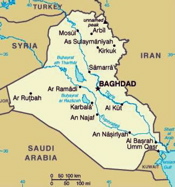Last week, the U.S.-led Multi-National Force-Iraq (MNF-I) had nothing but praise for Shiite theocrat-wannabe Moqtada al-Sadr. Prefacing his name with "al-Sayyid" (the Honorable), the United States acknowledged al-Sadr's legitimacy in the Iraqi political scene as U.S. commanders warmly embraced his decision to maintain a ceasefire between his roughly 60,000-strong illegal militia (Jaish al-Mahdi or JAM) and Iraqi government and coalition forces. With a tenuous domestic political situation in Iraq, the United States had no choice but to shake hands with the devil. Without question, the short-term effects of the U.S. surge strategy have been highly positive: significant reductions of violence in almost every province in the country, and especially in Baghdad, the epicenter of the insurgency. Hundreds of U.S. and likely thousands of Iraqi lives have been saved. This is due not only to the proper application of counterinsurgency doctrine and improvements in training and equipping Iraqi security forces, but also to a significant shift by the United States toward political accommodation with former enemies. Such political accommodation, however, depends on continued U.S. presence in the country. In the absence of any Iraqi central government outreach, the United States continues to pay, train, equip, and provide oversight of the Concerned Local Citizen (CLC) Sunni tribal militias (created by MNF-I, and strongly opposed by Prime Minister al-Maliki and others) and a host of other irregular forces used to bring insurgents in from the cold. The United States also is forced to offer its tacit acceptance of Moqtada al-Sadr, a radical Islamist looking to the Lebanese Hezbollah model for his movement's future. The central government has failed to win him over or connect in any way with his followers; and absent U.S. influence, the central government likely would marginalize or target both the Sunni elements and Sadrists, jeopardizing the relative stability in Iraq gained over the summer of 2007.
The United States’ Growing Political Entanglement in Iraq

